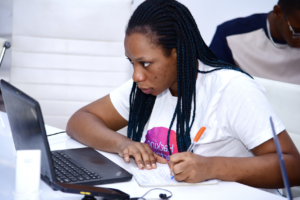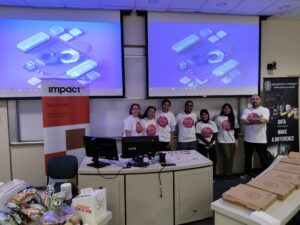“Hacking for trust” an international M.E.A.L Hackathon![]()
![]()
![]()
 Measuring and proving the value of impact-driven projects can be a challenge, impacting their reputation and funding.
Measuring and proving the value of impact-driven projects can be a challenge, impacting their reputation and funding. ![]() To tackle these issues, we
To tackle these issues, we![]() developed #HackingForTrust, a solution that enhances measurement techniques and helps projects showcase their impact. The hack introduced international development and humanitarian practices to web3 builders and fostered connections among participants from the Global North and the Global South. The event was co-organized by Polygon Labs, Impact Plus, and Georgetown University, and brought together participants from Brazil, Kenya, and Nigeria, as well as Georgetown students. One of the key objectives was to familiarize participants with Monitoring, Evaluation, Accountability and Learning methodologies, as well as to create awareness on properly creating governance mechanisms, establishing identities and ensuring ethical values are integrated in design methodologies
developed #HackingForTrust, a solution that enhances measurement techniques and helps projects showcase their impact. The hack introduced international development and humanitarian practices to web3 builders and fostered connections among participants from the Global North and the Global South. The event was co-organized by Polygon Labs, Impact Plus, and Georgetown University, and brought together participants from Brazil, Kenya, and Nigeria, as well as Georgetown students. One of the key objectives was to familiarize participants with Monitoring, Evaluation, Accountability and Learning methodologies, as well as to create awareness on properly creating governance mechanisms, establishing identities and ensuring ethical values are integrated in design methodologies
- CarbonVerifier (Brazil): This smart contract solution analyzes sensor data against predetermined thresholds, ensuring that carbon credits are only minted if a company meets emissions standards. This promotes accountability and encourages companies to reduce their carbon footprint proactively.
- Polygon Circular Community (Kenya): This Decentralized Autonomous Organization (DAO) aimsto support farmers in underserved regions of East Africa by providing financial assistance and investment opportunities. By integrating blockchain technologies such as Aave on Polygon and 1inch Fusion, the project enhances liquidity, facilitates Meta Swaps, and promotes financial inclusion.
- EcoWattX (Nigeria): Focusing on economic growth, financial inclusion, and social equity, Blockware’s blockchain solutions offer education, job matching, and fast financial services. The BWT token enables cross-border transactions and supports upcoming projects for transparent food supply chains and decentralized energy
The judges were divided into two teams. The first team consisted of international development experts led by Raquel Suárez from Impact Plus and Ryo Ragland from
 the World Food Program. The second team, led by Eduard Antuña Ligero and Jesús Ligero (both Polygon ZKevm experts), assessed the technical aspects of the hack. We are grateful for the support we have received from Polygon throughout the event, not only from the judges but also from other core units.
the World Food Program. The second team, led by Eduard Antuña Ligero and Jesús Ligero (both Polygon ZKevm experts), assessed the technical aspects of the hack. We are grateful for the support we have received from Polygon throughout the event, not only from the judges but also from other core units. ![]()
Significantly, the hackathon took a step towards self-sustainability, thanks to funding from 1Inch, MetaMask, and Aragon (and support from local organisations such as Convexity & Moringa school). Satisfied with the Hackathon, Georgetown has invited Polygon Labs & Impact Plus to run its Data Conference in September (the blockchain track)! The follow-up hackathon is scheduled for September, coinciding with the United Nations General Assembly.
Activity: Hacking for Trust
When: 28-30 April, 2023
Where: Brazil, Kenya, Nigeria, and the USA






